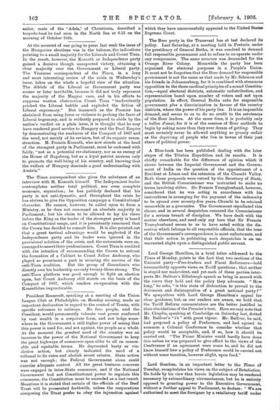Lord George Hamilton, in a brief letter addressed to the
Times of Monday, points to the fact that two sections of the Unionist party—Free-traders and Fiscal Reformers—hold irreconcilably opposite views on Tariff questions ; that neither is stupid nor malevolent, and yet each of these parties inter- prets Mr. Balfour's Edinburgh speech as being in accord with the views they hold and the policy they advocate. " How long," he asks, " is this state of distraction to prevail to the detriment and disintegration of a great national party ?" We sympathise with Lord George Hamilton's appeal for clear guidance, but, as our readers are aware, we hold that the Tariff Reform commentators are the better justified in their elucidations of the Premier's text. Here we may note that Mr. Chaplin, speaking at Cambridge on Saturday last, dotted Mr. Balfour's "i's " with great vigour. Mr. Balfour, he said, had proposed a policy of Preference, and had agreed to summon a Colonial Conference to consider whether that policy would be acceptable, and, if so, how it should be carried out. "The Primo Minister could hardly have done this unless he was prepared to give effect to the views of the Conference if an agreement were come to, and he did not know himself how a policy of Preference could be carried out without some taxation, however slight, upon food."










































 Previous page
Previous page